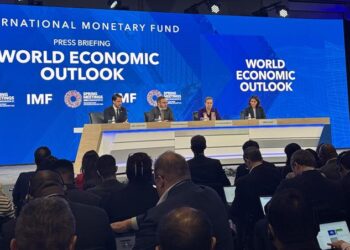Nigeria’s Budget Minister, Mr Udoma U. Udoma, recently claimed that the country has a sustainable debt profile and could borrow more money if it so wishes.
The Minister, who made this assertion while giving a speech in Indonesia at the recently held annual meeting of the IMF and the World Bank Group, also disputed the wide-spread concern over Nigeria’s debt figures.
In his defence, he described Nigeria as having one of the lowest debt levels on the African continent. He stated:
“Nigeria has a sustainable debt profile with ample room to borrow more whenever we may require doing so. Nigeria runs no debt risk and the Debt Management Office carries out an annual Debt Sustainability Analysis to ensure that we stay that way.” -Udoma
The IMF has a different perspective
The Minister’s claim comes barely a week after the International Monetary Fund (IMF) issued a serious warning to the country over its looming debt crisis. The organisation also advised the major oil producer to not be deceived by the increase in global prices but to make haste and lower its growing debt levels as well as urgently diversify its economy.
Note that Nigeria’s debt profile stood at N22.3 trillion as at the end of Q2 2018. The country currently spends about two-thirds of its revenues serving loans.
Meanwhile, the IMF is not the only one concerned
As we reported, former World Bank Vice President and Nigeria’s presidential hopeful, Mrs Oby Ezekwesili, recently criticised the President Muhammadu Buhari Administration over what she perceived as reckless Government loan deals; particularly Nigeria’s recent borrowings from China.
Even the Debt Management Office has acknowledged a rise in debt
Recall that Nigeria’s Debt Management Office (DMO), recently disclosed that the country’s debt increased by N9.61 trillion between mid-2015 and the end of 2017.
Note that this is the official figure as prepared by the government agency. The DMO also stated Nigeria’s debt is within the sustainable threshold of 56% recommended for developing countries, and that borrowed money is used for developmental purposes.
The cost of serving the loans keeps rising
Nigeria's cost of servicing debt keeps rising. It is very important to pay attention and ask how can the Nigerian government INCREASE revenue?
Excluding sinking fund expense, debt to revenue ratio, now 61%. #AskQuestions pic.twitter.com/tUMR472UUd
— BudgIT Nigeria (@BudgITng) October 12, 2018
In all these, one thing remains puzzling, and that is the fact that Nigeria continues to record abysmal economic development despite the millions of dollars that are borrowed annually. In other words, the loans do not impact ordinary Nigerians.




















m..they can avoid more borrowing by pushing the economy (1)if the cbn continues it’s OMO by making it deep and deeper (2) allows the local govt area to borrow by any means,when they do it, the lga will have more insight to broading and deepen it’s taxes collection,meaning with this democracy it’s taxes will be efficient.
The major problem in the national govt borrowing from left and right,there is too much leakage in the economy,it is becoming a bottomless pit.funds or finance are not meeting ideas or activities,and this is the major problem in the rises of inflation in Nigeria economy.(3)they could deregulate the economy further,but the problem of increases in corruption as the police forces is not well funded (4)the federal govt intervenes massively in social lending or giving free money to increases economic activities.kemi have the knowledge and education and experience to make Nigeria proud but she did not do it,which is very regretable
if the cbn deepen it’s OMO,it will leads to competitive economy if there is any increases in inflation,they should ignore it, with lga if well-funded,it will matches funding to economic activities.it will blockes some of the leakages in the economythey will have no choice in future and them many Nigerians are not surprised Mr Buhari did not fired kemi a long ago,we are in a suitiation” ABBB” any body but mr buhari.
I have read this IMF report of slow down in economic activities for this year and next,if it happen it will not be universal